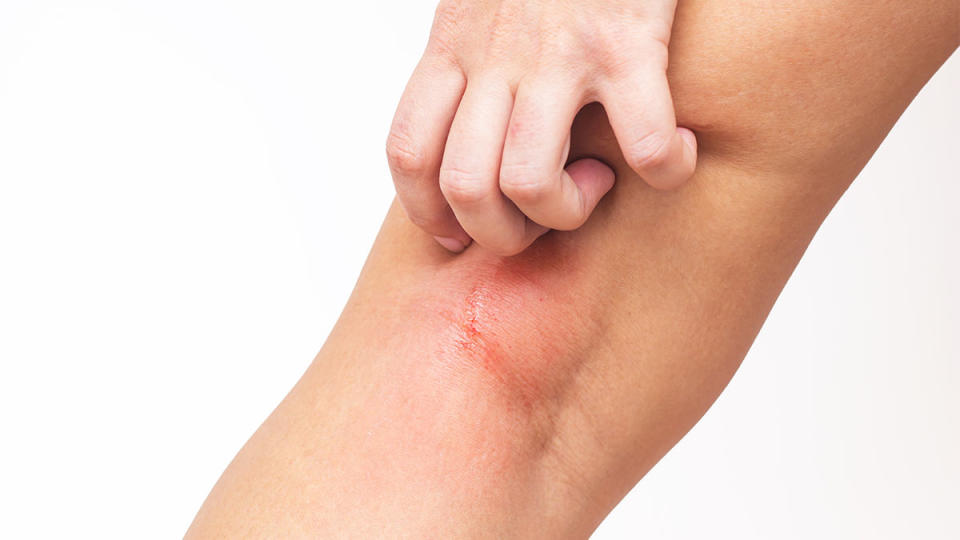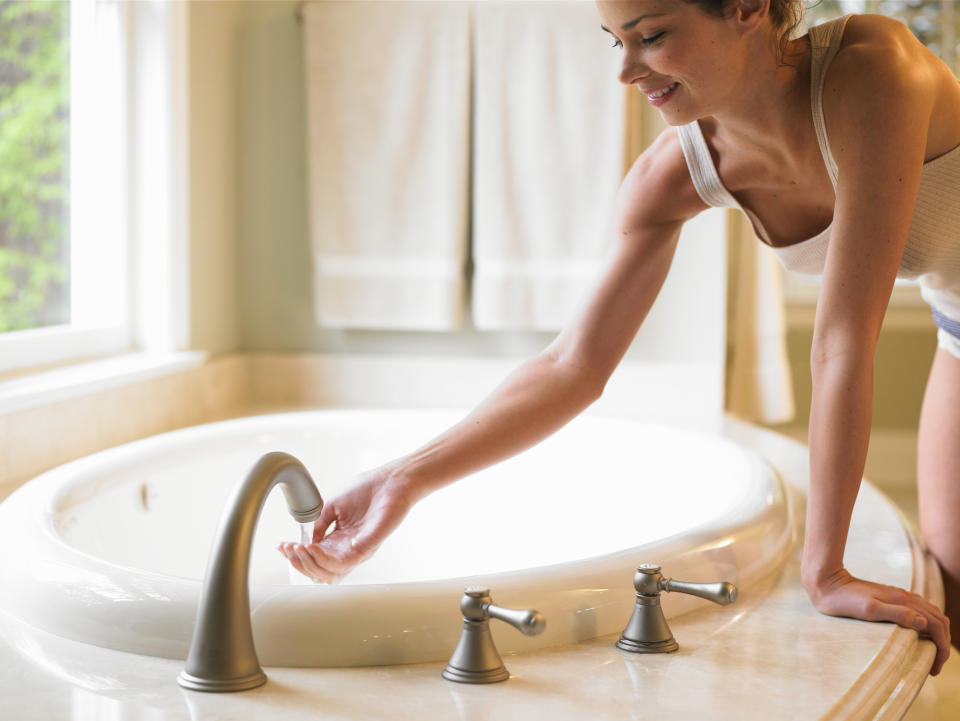Taking a Bath With This Laundry Staple Can Help Relieve Eczema, According to MDs
If you suffer from eczema, you know how painful, itchy and just out-right annoying it can be. And during the cold months, you'll likely find your eczema flaring up even more than usual. Finding an effective treatment isn't always easy, but if you've tried everything and are still itching, you might want to try soaking in a bleach-infused bath. Yes, we said bleach! It's safe, affordable and dermatologists recommend it! Keep scrolling to learn more about the benefits of a bleach bath for eczema.
What is eczema?

In order to understand why this seemingly unorthodox fix works (and to make it sound a little less scary!), it's important to understand eczema. Eczema, also known as atopic dermatitis, is an inflammatory skin condition that affects up to 30% of the U.S. population. It shows up in the form of red, itchy patches of extremely dry skin. Your skin may feel warm or swollen, and you may notice a rash, scaly patches, small bumps or blisters. On darker skin tones, eczema may cause dark brown, purple or grayish discoloration rather than a red rash.
The rashes can develop anywhere on the skin (most often on the arms and behind the knees, but also on the breasts) and are endlessly irritating. People who struggle with eczema also often struggle to find relief, as the condition doesn't always respond to one simple treatment. To make matters worse, these patches often become infected when bacteria or viruses get into the overly scracthed open wounds.
Unfortunately, it often takes a lot of trial and error to find the right eczema treatment for you. Most folks with eczema turn to moisturizers, and are sometimes prescribed steroids, for relief from the itch — but doctors are touting the effectiveness and speed of a bleach bath to ease irritation.
Related: “I’m a Dermatologist and Here’s Why *This* Is the Best Makeup for Eczema-Prone Skin.”
How does putting bleach in the bath releive eczema?
Simply put, bleach kills the bacteria on the skin and helps reduce painful symptoms like inflammation and redness. “It gently exfoliates skin to reduce the scaliness that accompanies eczema,” explains New York City Dermatologist Debra Jaliman, MD.
The practice is approved by the Mayo Clinic and the National Eczema Association, both of which point to research on how bleach baths kill harmful bacteria. "Diluted bleach baths offer antibacterial and anti-inflammatory benefits to the skin. Studies have shown they can reduce the bacterial load on the skin, which is important as microbial infections of the skin can potentially trigger and worsen eczema flares," explains Pooja Rambhia, MD, board-certified dermatologist in New York City.
Still sound a little crazy to you? It's nothing you haven't done before, in fact, think of all the times you've gone swimming in chlorine-filled pools. The chemical is essentially, bleach.
The only caveat? It often takes a combination of treatments to really target eczema. "It is important to realize that diluted bleach bathes are not a standalone treatment for eczema," says Dr. Rambhia. "Instead, they are one component of a multi-faceted approach to eczema that includes minimizing exposure to skin irritants, liberal use of moisturizers and use of anti-inflammatory medications when necessary."
How to take a bleach bath for eczema

First things first: It's always a good idea to talk to your dermatologist before trying a new at-home skin-related treatment. And if you're concerned about vaginal health, it's best to skip it: bleach baths can change the vaginal flora, since they kill both good and bad bacteria, and potentially lead to yeast infections.
To ensure that your bleach bath for eczema is safe, Dr. Rambhia advises adding just a ? cup of bleach to a half-full tub of lukewarm water or a ? cup of bleach to a full tub of lukewarm water. You won't want to add more bleach than that — otherwise, it could do the opposite and further irritate your skin. "Avoid using hot water; it can deplete the skin's natural oils, thereby weakening its protective barrier rendering it more vulnerable to irritation and inflammation."
Next, soak for 10 minutes. After the bath, do a quick rinse with just a regular shower to reduce the chances of irritation developing without decreasing the benefits of your soak. “Limit a bleach-infused bath to once a week, since bleach can end up drying out skin,” advises Dr. Jaliman.
Below is a video by the American Academy of Dermatology on how to take a bleach bath for eczema:
No bleach on hand? Try oatmeal! Oats contain antioxidants, which can help soothe and calm the itchiness and inflammation that comes with an eczema flare-up. Also great: "Studies have demonstrated that colloidal oatmeal contains high-concentrations of lipids that help to restore the skin barrier and reduce transepidermal water loss. This can help to reduce the symptoms of itch in some patients," says Dr. Rambhia.
To do: Pour 1 cup of oats into a blender or food processor and blend until they are a very fine, powder-like consistency. Then simply pour into a warm bath, and soak for just 5-10 minutes to prevent drying out the skin.
Related: Oatmeal for Eczema — Why it Works and How to Use it For Instant Relief
Once you've finished your soak, it's just as important to employ a good post-bath routine. Start by patting your skin dry, not aggressively rubbing skin or trying to soak up all of the water moisture. Next, "while the skin is still damp, immediately apply any topical prescription medications (if advised by your dermatologist), followed by a fragrance-free moisturizing cream or ointment to lock in moisture," advises Dr. Rambhia. Two of our favorite scentless moisturizers are the Eucerin Eczema Relief Flare-up Treatment (Buy from Amazon, $7.89) and the CeraVe Itch Relief Moisturizing Lotion (Buy from CVS, $20.99).
For more tips to treat eczema, click through these stories:
“I’m a Dermatologist and Here’s Why *This* Is the Best Makeup for Eczema-Prone Skin.”
Fight Eczema, Acne, Psoriasis, and More With Hemp Oil
10 Products for Eczema-Prone Skin That Will Literally Change Your Life
